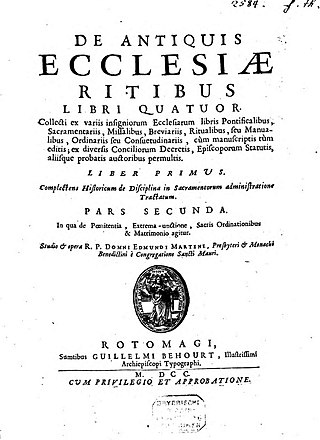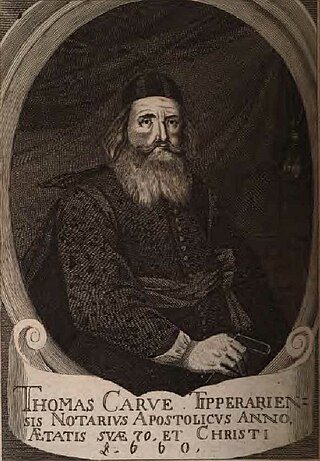Primate is a title or rank bestowed on some important archbishops in certain Christian churches. Depending on the particular tradition, it can denote either jurisdictional authority or (usually) ceremonial precedence.
Acta Sanctorum Hiberniae is the abbreviated title of a celebrated work on the Irish saints by the Franciscan, John Colgan.

Edmond Martène was a French Benedictine historian and liturgist.
Peter van Hove (–1793) was a Flemish Friar Minor, lector in theology and exegete.
Henricus Canisius was a Dutch canonist and historian.
Niccolò Orlandini was an Italian Jesuit author.
Saint Clement of Ireland (Clemens Scotus) (c. 750 – 818) is venerated as a saint by the Catholic Church.
Eithne and her sister Sodelb are two relatively obscure Irish saints from Leinster who are supposed to have flourished in the 5th century. They are commemorated together in the Irish martyrologies on 29 March, though 2 and 15 January were also marked out as feast-days. The 17th-century scholar John Colgan believed that a Life written for them had been witnessed in c. 1490 by Cathal Óg Mac Maghnusa, whom he regarded as the author of additions to the Félire Óengusso. Although nothing of the kind has come to light, they do make cameo appearances in the Lives of two better known 6/7th-century saints, Áedan and Moling, both bishops of Ferns.
Stephen White, SJ (1575–1646) was a Jesuit author and antiquarian who wrote about the early Irish saints.
David Rothe was a Roman Catholic Bishop of Ossory.

John Colgan, OFM, was an Irish Franciscan friar noted as a hagiographer and historian.
Richard Creagh was an Irish Roman Catholic clergyman who was the Archbishop of Armagh and Primate of All Ireland in the second half of the sixteenth century.

Thomas Carve was an Anglo-Irish historian. His correct name was Carew, that of a family of great influence in Munster during the fifteenth and sixteenth centuries.
Thomas Messingham was an Irish hagiologist, born in the Diocese of Meath. He studied at the Irish College, Douai before going to the Irish College, Paris, proceeding to the degree of S.T.D. Among the Franciscan Manuscripts in Dublin is an interesting tract sent by David Rothe, Vice-Primate of All Ireland, addressed to my "loving friend Mr. Thomas Messingham at his chambers in Paris", dated 1615. It is evident that at this date Messingham was one of the staff of the Irish College in that city, and was commencing his studies on Irish saints.
John Punch (1603–1661) was an Irish Franciscan scholastic philosopher and theologian.
Aodh Buidhe Mac an Bhaird, O.F.M., was an Irish Franciscan friar who was a noted poet, historian and hagiographer. He is considered the founder of Irish archaeology.
Malachy Ó Caollaidhe, also known as Malachy Queally, Malachias Quælly, O'Queely or O'Quechly was an Irish Roman Catholic archbishop of Tuam; he was called by Irish writers Maelseachlainn Ua Cadhla, by John Colgan Queleus, and erroneously by Thomas Carte, O'Kelly.
Dalua of Tibradden, also called Dalua of Craoibheach, was an early Irish saint who is said to have been a disciple of St. Patrick. He founded a church that became known as Dun Tighe Bretan (Tibradden) which is located today in the townland of Cruagh, County Dublin.
Disert is a townland in the civil parish of Kildallan, barony of Tullyhunco, County Cavan, Ireland.


